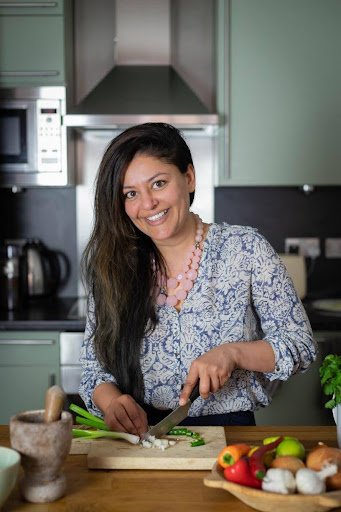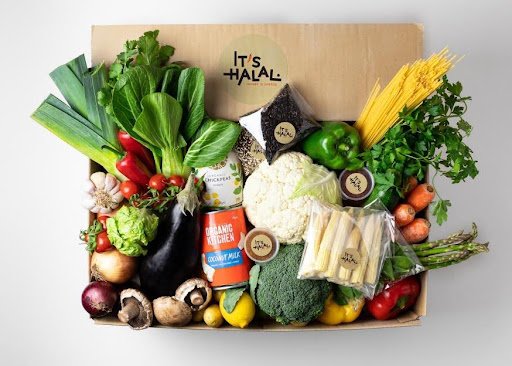Bridging Cultures Through Halal: How 'It's Halal' is Revolutionising the UK's Meal-Kit Industry
In a market ripe for innovation, Saima saw a unique opportunity to address a significant gap with "It's Halal," a meal-kit service tailored to meet the needs of the Muslim community in the UK.
The inspiration for this venture stemmed from both personal frustrations with existing meal-kit options and a clear market demand for halal-certified ingredients. As the Muslim population in the UK continues to grow, the need for convenient, halal-compliant meal solutions has become increasingly evident.
"It's Halal" was created not just to fill this void but to offer a service that combines convenience with cultural and dietary respect. By focusing on halal principles and addressing both environmental and inclusivity concerns, “It's Halal” aims to revolutionize the meal-kit industry and foster greater understanding across diverse communities.
Nicolle: What inspired you to create It’s Halal, and how did you identify the need for a Halal meal-kit service in the UK market?
Saima: The idea for "It's Halal" was born out of personal experience and market observation. The existing meal-kit options either lacked halal-certified ingredients or offered very limited choices, leaving a significant gap in the market. During conversations with friends and community members, it became clear that many others shared this frustration. They wanted the convenience of meal kits but also needed to be assured that the ingredients met halal standards.
This realisation highlighted a genuine need for a service that catered specifically to the halal market. Additionally, the UK has a large and growing Muslim population, and the demand for halal products has been steadily increasing across various sectors. However, the meal-kit industry has yet to fully tap into this market. This presented an opportunity to create a service that not only addressed a personal need but also served a wider community.
Nicolle: How does It’s Halal differentiate itself from other meal-kit services like Hello Fresh, particularly in terms of catering to the Muslim demographic and those observing the Halal diet?
By launching "It's Halal," we aimed to provide a solution that combined convenience, variety, and adherence to halal principles. The service was designed to offer a range of meals that were both exciting and aligned with Islamic dietary laws, making it easier for Muslim families and individuals to enjoy the benefits and convenience of meal kits without any compromise.
Nicolle: Your mission includes being mindful of your environmental footprint. How does It’s Halal ensure sustainability in its packaging and sourcing of ingredients?
Saima: Our mission extends beyond providing halal-certified meals; we're committed to minimizing our environmental footprint throughout our operations. We believe ethical sourcing and packaging are crucial not only to reflect our values but also to benefit the planet. Recognizing packaging as a key concern, we use only recyclable materials from the outer boxes to the contents within, carefully designed to reduce excess and protect food freshness while minimizing environmental impact.
We continuously seek innovative packaging solutions and collaborate with suppliers who offer sustainable alternatives to traditional plastics. Encouraging our customers to recycle is also a priority. In ingredient sourcing, we emphasize local suppliers practicing sustainable agriculture and ethical farming, reducing carbon emissions from transportation and supporting local economies.
Our halal standards are integrated with our sustainability goals, ensuring that all meat and poultry come from sources that are both halal-certified and committed to sustainable practices. We are dedicated to ongoing improvement, regularly reviewing our methods and incorporating feedback to uphold the highest environmental and ethical standards in the meal-kit industry.
Nicolle: Can you share how It’s Halal promotes inclusivity and diversity through its meal kits, and how does this contribute to breaking down barriers and fostering understanding between different cultures?
Saima: Inclusivity and diversity are central to our mission. We believe food can unite people and foster cultural understanding. Our meal kits celebrate the richness of global cuisines, featuring 223 recipes from 23 cultures, including Middle Eastern, South Asian, African, Mediterranean, and South American dishes—all adhering to halal dietary principles.
Our kits invite customers to explore and appreciate diverse culinary traditions, breaking down cultural barriers through shared meals. Halal food is not just for Muslims; it's enjoyed by a wide audience, including non-Muslims, for its diverse flavours and ethical standards. Each recipe card includes stories and insights about the dish’s origins, enriching the cooking experience and promoting cultural respect.
We engage with our community through social media and events, encouraging dialogue and connection. Our goal is to inspire a greater appreciation for the world's diversity and foster a more inclusive society.
Nicolle: What role does food play in eradicating racism and prejudice, and how does It’s Halal encourage cultural exchange through its offerings?
Saima: Food is a universal language that transcends borders, cultures, and beliefs. It has the power to connect people, spark conversations, and break down barriers of misunderstanding and prejudice. Sharing a meal allows individuals from different backgrounds to come together, learn about each other’s cultures, and find common ground. In this way, food plays a crucial role in challenging stereotypes, reducing racism, and promoting inclusivity.
Our diverse menu includes recipes from various cultures, each thoughtfully selected to introduce our customers to the rich culinary traditions of different communities for instance we recently introduced Sudanese and Yemeni cuisines. By bringing these flavours into homes across the UK, we encourage our customers to explore, appreciate, and celebrate the diversity of the world’s cuisines. We believe that when people learn about and appreciate each other's traditions, it helps to break down prejudices and build a more inclusive society.
In this way, "It’s Halal" not only provides delicious and halal-compliant meals but also plays a role in building bridges between cultures. By highlighting the beauty of our differences through food, we contribute to a broader movement against racism and prejudice, fostering a more understanding and unified community.
Nicolle: How do you decide on the diverse range of cuisines featured in your meal kits, and what has the response been like from customers who are eager to explore new dishes?
Saima: Our goal is to offer a culinary journey that showcases the rich diversity of global flavours while adhering to halal standards. When selecting cuisines for our meal kits, we focus on three key factors:
Cultural representation: We aim to reflect a wide range of cultures, celebrating the culinary traditions of regions like the Middle East, South Asia, Africa, and Southeast Asia. This approach allows our customers to explore new flavours while appreciating the cultural significance of each dish.
Customer interest: We listen to our customers and monitor food trends, using feedback from surveys and social media to tailor our offerings to their preferences. This ensures our meal kits stay relevant and exciting.
Innovation and tradition: Our culinary team balances the authenticity of classic dishes with modern twists, keeping our offerings fresh and appealing.
The response has been overwhelmingly positive, with customers eager to explore new cuisines from the comfort of their kitchens. Our meal kits help broaden culinary horizons while enhancing the overall dining experience.
Nicolle: As the founder of a leading Halal meal-kit service, what are your long-term goals for Its Halal, both in terms of business growth and social impact?
Saima: As the founder of "It’s Halal," my vision goes beyond providing high-quality halal meal kits; we aim to make a lasting impact in both the market and the communities we serve. Although we've become a leading halal meal-kit service in the UK, we know there’s much more potential to unlock. Our primary focus is on expanding our visibility across the UK and reaching untapped markets, while also exploring opportunities to expand into Europe, where there’s growing demand for our service. Social impact is central to our business. Sustainability guides our operations, from sourcing local, ethically produced ingredients to using recyclable packaging. We are committed to continually improving our practices to reduce our environmental footprint. Additionally, by offering a diverse range of global cuisines, we strive to foster cultural understanding and inclusivity, breaking down barriers and promoting diversity. Our long-term goal is to grow our business while using food to connect people and build more inclusive communities.
_
Nicolle Knapova is a 30-year-old young adult writer and freelance blogger from the Czech Republic. She has a master’s degree in Creative Writing and Publishing at Bournemouth University. She loves to write about music, books and TV shows. If she’s not writing her fan fiction, she’s writing her poetry and sharing it on her Instagram @elisecaverly.





